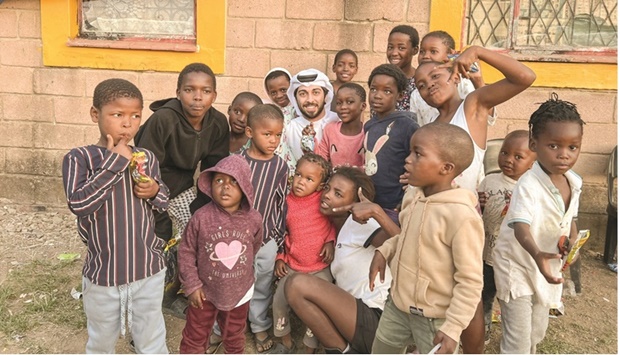A joint relief delegation from Qatar Fund for Development (QFFD) and Qatar Red Crescent Society (QRCS) has been deployed to South Africa as part of the QFFD-funded emergency response to the Durban floods.
Having arrived on May 25, the delegation held coordination meetings with the authorities concerned, supervised relief operations, and distributed aid to the victims.
A day following their arrival in Johannesburg, the delegation held a meeting with the president and staff of the South African Red Cross Society (SARCS), to get updates about the situation and coordinate the procurement of relief aid.
Part of the items was purchased from the local market in South Africa, and another humanitarian airfreight was deployed from Qatar.
Also, all logistics, plans, and distribution mechanisms were agreed upon.
The following days saw the team holding a series of coordination meetings with SARCS, Crisis and Disaster Management, and other government representatives.
There was a coordination meeting among the QFFD-QRCS delegation, SARCS representatives, and officials of the Embassy of Qatar in South Africa.
The relief delegation traveled to the flood-affected city of Durban to hold more coordination meetings and make an assessment visit to the worst-hit areas.
They were accompanied by Tariq Ali Faraj al-Ansari, Ambassador Extraordinary and Plenipotentiary of Qatar to South Africa; Dr Mohamed Salah Ibrahim, director of Relief and International Development Division at QRCS’ headquarters in Doha; QFFD’s delegation; and South African government officials.
Upon the arrival of the humanitarian aid aircraft deployed from Qatar, al-Ansari, South Africa’s foreign minister, and many government officials attended the shipment clearing.
The two sides held a meeting to discuss the friendly relations between the two countries, followed by a press conference to explain the nature and details of the humanitarian intervention.
As of May 30, QRCS’ relief personnel have been distributing the QFFD-funded humanitarian aid, which consisted of diverse relief items such as food products, blankets, and hygiene kits.
Also, drinking water tankers were deployed, and physical activities were held for children, such as sports games and football competitions.
So far, these distributions have covered 1,794 persons from the most affected families in numerous areas and shelter camps.
A day following their arrival in Johannesburg, the delegation held a meeting with the president and staff of the South African Red Cross Society (SARCS), to get updates about the situation and coordinate the procurement of relief aid.
Part of the items was purchased from the local market in South Africa, and another humanitarian airfreight was deployed from Qatar.
Also, all logistics, plans, and distribution mechanisms were agreed upon.
The following days saw the team holding a series of coordination meetings with SARCS, Crisis and Disaster Management, and other government representatives.
There was a coordination meeting among the QFFD-QRCS delegation, SARCS representatives, and officials of the Embassy of Qatar in South Africa.
The relief delegation traveled to the flood-affected city of Durban to hold more coordination meetings and make an assessment visit to the worst-hit areas.
They were accompanied by Tariq Ali Faraj al-Ansari, Ambassador Extraordinary and Plenipotentiary of Qatar to South Africa; Dr Mohamed Salah Ibrahim, director of Relief and International Development Division at QRCS’ headquarters in Doha; QFFD’s delegation; and South African government officials.
Upon the arrival of the humanitarian aid aircraft deployed from Qatar, al-Ansari, South Africa’s foreign minister, and many government officials attended the shipment clearing.
The two sides held a meeting to discuss the friendly relations between the two countries, followed by a press conference to explain the nature and details of the humanitarian intervention.
As of May 30, QRCS’ relief personnel have been distributing the QFFD-funded humanitarian aid, which consisted of diverse relief items such as food products, blankets, and hygiene kits.
Also, drinking water tankers were deployed, and physical activities were held for children, such as sports games and football competitions.
So far, these distributions have covered 1,794 persons from the most affected families in numerous areas and shelter camps.

